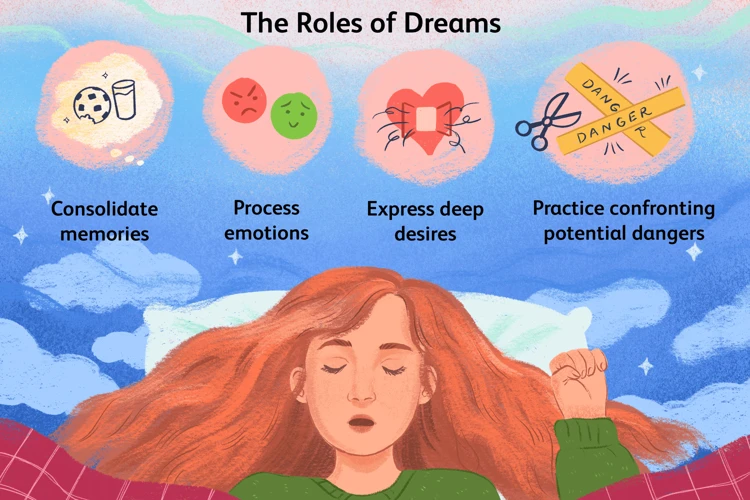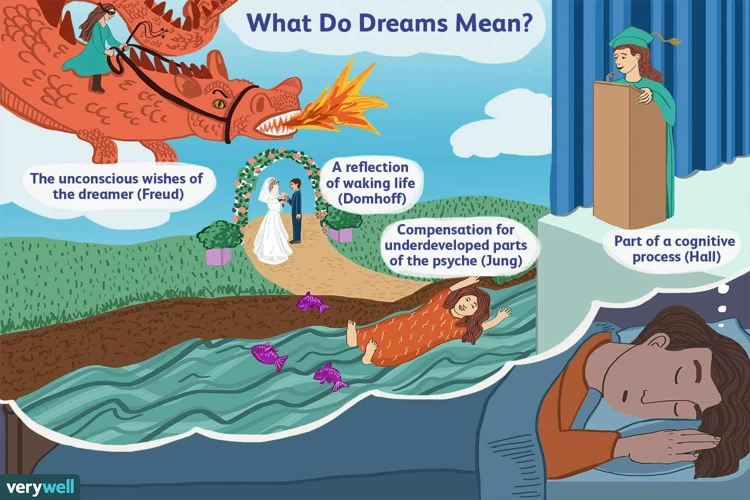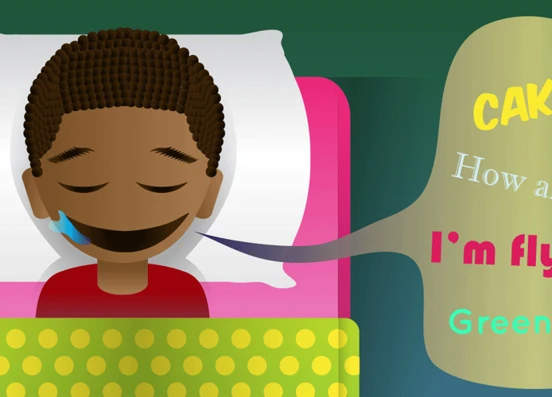Sleep talking, a curious phenomenon that occurs during sleep, has long fascinated both scientists and laypeople alike. The mumbled words, incoherent phrases, and even occasional outbursts that escape from a person’s lips while they slumber raise a multitude of questions. What is the significance behind these nocturnal utterances? What do they reveal about the subconscious mind? In this article, we will delve into the realm of sleep talking, exploring its psychological meaning step by step. Through our exploration, we hope to shed light on this enigmatic behavior and provide valuable insights into its origins and implications for the human psyche. So, let us embark on this journey together and unlock the secrets hidden within our sleep-talking selves.
Understanding Sleep Talking

Sleep talking is a fascinating phenomenon that occurs during various stages of sleep, and its understanding can provide valuable insights into the complexities of the human mind. To grasp the concept of sleep talking better, it is essential to define what it entails. Sleep talking, also known as somniloquy, refers to the act of speaking during sleep without the sleeper’s awareness or control. It can range from simple mumbling to more complex conversations and even loud exclamations. Sleep talking is fairly common, with estimates suggesting that about 5% of adults engage in this behavior. One interesting aspect of sleep talking is its frequency and prevalence, which can vary from person to person. Some individuals may experience occasional episodes, while others may talk in their sleep more frequently. Exploring the frequency and prevalence of sleep talking can help us gain a better understanding of this unique phenomenon. For additional information about the types of sleep talking, myths and facts surrounding it, or even real case studies, you can check out the relevant links on types of sleep talking, myths and facts about sleep talking, and real case studies on sleep talking.
Definition of Sleep Talking
Sleep talking, also referred to as somniloquy, is a peculiar phenomenon that involves the act of speaking during sleep without the sleeper’s conscious awareness or control. The definition of sleep talking encompasses a wide range of vocalizations that can occur at any stage of sleep, from light sleep to deep sleep. These vocalizations can vary in intensity and duration, ranging from simple murmurs and mumbles to more coherent speech and even loud outbursts. Sleep talking can occur in any language and may consist of nonsensical gibberish, reciting fragments of conversations, or even coherent sentences. It is important to note that the content of sleep talking is often unrelated to the individual’s conscious thoughts or experiences and can be influenced by the dream state. While the exact causes of sleep talking remain uncertain, it is believed to stem from a partial arousal during sleep, where the brain is still in a sleep state but activates the speech centers in the mind. This unique behavior provides a fascinating insight into the complexities of sleep and the subconscious mind.
Frequency and Prevalence
The frequency and prevalence of sleep talking can vary from person to person. Some individuals may experience occasional episodes of sleep talking, while others may talk in their sleep more frequently. It is estimated that about 5% of adults engage in sleep talking, although the exact numbers may vary. Interestingly, sleep talking is more common in children, with up to 50% of kids experiencing episodes of sleep talking at some point. The frequency of sleep talking can also differ within individuals, with some nights being more prone to sleep talking than others. External factors such as stress, alcohol consumption, sleep deprivation, and certain medications can influence the occurrence of sleep talking. Understanding the frequency and prevalence of sleep talking can provide valuable insights into its nature and help individuals and their loved ones better cope with and address this behavior.
Psychological Significance

Delving into the psychological significance of sleep talking unveils intriguing insights into the workings of the human mind during slumber. Sleep talking may provide a window into our unconscious thoughts and desires. As we sleep, our subconscious mind becomes less inhibited, allowing repressed emotions and desires to surface. Through sleep talking, these hidden aspects of our psyche may find expression, offering glimpses into our innermost thoughts and motivations. Additionally, sleep talking plays a role in emotional processing. It allows us to process and navigate through intense emotions, such as fears or anxieties, in a way that may be more fluid and unrestricted than during waking hours. Sleep talking may serve as a mechanism for conflict resolution. By vocalizing their feelings and thoughts during sleep, individuals may resolve inner conflicts or express unvoiced concerns from their waking lives. Understanding the psychological significance of sleep talking gives us valuable insights into the complex interplay between our conscious and subconscious minds.
Unconscious Thoughts and Desires
When it comes to sleep talking, one of the most intriguing aspects is its potential connection to unconscious thoughts and desires. During sleep, our subconscious mind takes over, and sleep talking offers a window into this hidden realm. The words and phrases uttered during sleep often reflect the thoughts, desires, and even fears that we may not be consciously aware of in our waking state. Sleep talking can act as a glimpse into the deeper layers of our psyche, revealing unfiltered thoughts and emotions that we may not express during our waking hours. It is believed that the content of sleep talking can be influenced by events and experiences from the past, as well as our current psychological state. Paying attention to the themes and patterns that emerge in sleep talking episodes can provide valuable insights into our underlying beliefs, desires, and unresolved conflicts. By exploring these unconscious thoughts and desires, we can gain a deeper understanding of ourselves and potentially work towards personal growth and self-awareness.
Emotional Processing
Emotional processing during sleep talking is an intriguing aspect that sheds light on the deeper workings of the subconscious mind. When we dream and engage in sleep talking, our emotions often come to the forefront, manifesting in various ways. Sleep talking provides a unique window into our emotional landscape, allowing us to express and process emotions that may be suppressed or unresolved during our waking hours. These emotional expressions can take the form of passionate declarations, tearful confessions, or even angry outbursts. The content of our sleep talking can be influenced by past experiences, unresolved conflicts, and current stressors. It is believed that during sleep, our subconscious mind is more active and less inhibited, allowing for the release of pent-up emotions. By analyzing the emotional content of sleep talking episodes, psychologists and researchers can gain valuable insights into an individual’s inner emotional state and potentially identify unresolved issues that may be impacting their well-being. However, it is important to note that interpreting emotions expressed during sleep talking can be challenging, as the context and symbolism can be highly subjective. Consulting with professionals and engaging in self-reflection can help individuals gain a deeper understanding of their emotional processing during sleep talking and its impact on their overall psychological well-being.
Conflict Resolution
– Sleep talking can also serve as a means of conflict resolution within the subconscious mind. During sleep, the brain processes unresolved conflicts and emotions, often incorporating them into dreams and sleep talking episodes. Through sleep talking, individuals may express their inner conflicts, frustrations, or unresolved issues, allowing their subconscious mind to work through them. This can provide a sense of relief and release, as the sleeping mind attempts to find resolution and closure to these conflicts.
– Sleep talking may reveal buried emotions and thoughts related to interpersonal conflicts. Verbalizing these thoughts during sleep can be a way for the unconscious mind to express suppressed feelings that may be challenging to confront or address while awake. By speaking about these conflicts during sleep, individuals may gain insights into their own emotions and perspectives, providing an opportunity for self-reflection and personal growth.
– Sleep talking can facilitate communication and understanding between individuals involved in the conflict. In cases where two people share a bed or sleep in close proximity, sleep talking can potentially provide a glimpse into the thoughts and concerns of the other person. Through deciphering and discussing the sleep talking episodes, individuals may gain insights into each other’s perspectives and work towards resolving conflicts in a conscious and awake state.
– It is important to note that interpreting sleep talking for conflict resolution requires caution and should not replace open and honest communication while awake. Sleep talking is not always a direct representation of waking thoughts or desires, as it can be influenced by the dream state. Nevertheless, it can serve as a gateway to explore unresolved conflicts and pave the way for constructive dialogue and problem-solving when approached with sensitivity and understanding.
Common Themes in Sleep Talking

As we delve deeper into the psychological meaning behind sleep talking, it becomes evident that certain common themes tend to emerge from these nocturnal utterances. One prevalent theme is recurring dreams and nightmares. Sleep talkers may often vocalize elements of their dreams, providing a window into their subconscious mind as their thoughts spill over into the waking world. Stress and anxiety also frequently manifest in sleep talking episodes, with individuals expressing their worries and concerns during sleep. It is not uncommon for past traumatic experiences to resurface in sleep talking as well, as the sleeping mind tries to process and cope with unresolved emotions. These common themes offer valuable insights into the inner workings of the human psyche, shedding light on the underlying thoughts, fears, and experiences that can shape our dreams and nightly conversations.
Recurring Dreams and Nightmares
Recurring dreams and nightmares are a common theme observed in sleep talking episodes. These dreams and nightmares can be vivid, intense, and often repeat themselves with slight variations. Sleep talking provides a window into the world of these recurring dreams, offering valuable insights into a person’s subconscious thoughts and emotions. The content of these dreams can vary greatly from person to person, but they often touch upon unresolved issues, past traumas, fears, or anxieties. Sleep talkers may vocalize their fears, express distressing emotions, or even reenact scenarios from their dreams. This suggests that sleep talking serves as a means for the mind to process and confront unresolved psychological conflicts that manifest in the form of recurring dreams or nightmares. It is important to note that recurring dreams and nightmares can be a manifestation of unresolved psychological issues in a person’s waking life. They can reflect unprocessed emotions, hidden desires, or unconscious conflicts that the individual may be unaware of. By analyzing the content of sleep talking episodes with recurring dreams and nightmares, individuals and professionals alike can gain valuable insights into the underlying psychological themes and promote further self-awareness and growth.
Stress and Anxiety
Stress and anxiety play significant roles in sleep talking, as they are often intertwined with this intriguing behavior. When individuals experience high levels of stress or anxiety during their waking hours, it can manifest as sleep talking during their sleep. Sleep talking serves as an outlet for the subconscious mind to express these pent-up emotions and concerns. It is not uncommon for individuals to vocalize their worries, fears, or even ruminate on stressful events during sleep talking episodes. The content of these utterances may revolve around work-related stress, relationship troubles, financial concerns, or any other anxiety-inducing factors in one’s life. In some cases, sleep talking can act as a reflection of unresolved emotional issues, and by analyzing the content of these nocturnal conversations, individuals may gain insight into their underlying stressors. An interesting approach to understanding the relationship between stress, anxiety, and sleep talking is to create a table that highlights the various stressors and their corresponding sleep talking themes:
| Stressor | Sleep Talking Theme |
|---|---|
| Work-related stress | Repetitive discussions about deadlines, tasks, or conflicts with colleagues |
| Relationship issues | Vocalizing arguments, expressing insecurities, or mentioning a specific person’s name |
| Financial concerns | Talking about bills, debts, or financial struggles |
| General anxiety | Unintelligible mumbling or restless vocalizations |
Understanding the connection between stress, anxiety, and sleep talking can be valuable for individuals seeking to manage their emotional well-being. By identifying the underlying stressors that contribute to sleep talking episodes, individuals can take proactive steps towards stress reduction and implementing effective coping strategies both during the day and at bedtime.
Past Traumatic Experiences
Past traumatic experiences can play a significant role in sleep talking, as they often find their way into the subconscious mind and manifest during sleep. Sleep talking can serve as a window into unresolved trauma, giving voice to emotions, memories, and thoughts that may have been buried or suppressed in the waking hours. People who have experienced traumatic events such as abuse, accidents, or natural disasters may frequently engage in sleep talking as a way for their subconscious mind to process and cope with the unresolved trauma. Sleep talking can involve reliving specific moments or events related to the trauma, exhibiting the lingering impact it has on the individual’s psyche. However, it’s important to note that not everyone who experiences past traumatic experiences will engage in sleep talking. Each person’s response to trauma is unique, and while sleep talking may occur in some individuals, others may exhibit different sleep-related symptoms or none at all. It is crucial for individuals who suspect their sleep talking may be related to past trauma to seek appropriate professional help, such as therapy or counseling, to navigate the healing process and develop healthy coping mechanisms.
Psychological Disorders and Sleep Talking

Sleep talking can sometimes be associated with certain psychological disorders, shedding light on the intricate relationship between our mental health and sleep behaviors. One such category of disorders is sleep disorders, where sleep talking can be a symptom. Conditions like sleep apnea, REM sleep behavior disorder, and night terrors can contribute to sleep talking episodes. Additionally, several psychiatric disorders have been linked to sleep talking, including anxiety disorders, mood disorders, and post-traumatic stress disorder (PTSD). These disorders can disrupt the normal sleep cycle and potentially increase the likelihood of sleep talking. Understanding the connection between psychological disorders and sleep talking can aid in both the diagnosis and treatment of these conditions, as addressing the underlying mental health issues may help reduce or eliminate sleep talking episodes. It is important to note that while sleep talking can be associated with psychological disorders, it does not necessarily indicate the presence of a disorder in all cases.
Sleep Disorders
Sleep disorders are a significant factor to consider when exploring the psychological meaning behind sleep talking. Various sleep disorders can contribute to the occurrence of sleep talking or even exacerbate existing sleep talking habits. One common sleep disorder associated with sleep talking is sleep apnea, which involves episodes of paused or shallow breathing during sleep. Sleep apnea can lead to fragmented sleep and disrupted breathing patterns, potentially triggering sleep talking episodes. Another sleep disorder that can be linked to sleep talking is REM behavior disorder (RBD). RBD causes individuals to act out their dreams physically during REM sleep, which can include talking. Additionally, other sleep disorders like insomnia or restless leg syndrome may lead to sleep disturbances that could contribute to sleep talking episodes. It is crucial to understand that sleep disorders can affect sleep quality, leading to an increased likelihood of sleep talking. If sleep disorders are suspected, it is important to seek professional help and undergo a thorough evaluation to address the underlying cause and minimize the impact on sleep talking occurrences.
Psychiatric Disorders
Psychiatric disorders have been found to have a significant correlation with sleep talking. People who suffer from certain mental health conditions are more likely to engage in sleep talking compared to those without these disorders. Some of the psychiatric disorders commonly associated with sleep talking include:
1. Anxiety Disorders: Anxiety disorders, such as generalized anxiety disorder, panic disorder, or post-traumatic stress disorder (PTSD), can contribute to sleep talking. The heightened levels of anxiety and stress experienced by individuals with these disorders may manifest in their sleep behavior, leading to increased sleep talking episodes.
2. Schizophrenia: Schizophrenia is a severe psychiatric disorder characterized by disorganized thinking, hallucinations, and delusions. Sleep disturbances, including sleep talking, are commonly observed among individuals with schizophrenia. The content of their sleep talking may be reflective of their disorganized thought processes and hallucinations.
3. Bipolar Disorder: Bipolar disorder is a mood disorder characterized by alternating episodes of depression and mania. During manic episodes, individuals may experience increased energy, impulsivity, and rapid speech. These symptoms can potentially manifest in sleep talking, where the excessive talkativeness seen in manic states may continue during sleep.
4. Obsessive-Compulsive Disorder (OCD): OCD is an anxiety disorder that causes individuals to have recurring thoughts and engage in repetitive behaviors or rituals. Although sleep talking is not directly related to OCD, the increased levels of anxiety and intrusive thoughts associated with this disorder may contribute to sleep disturbances, including talking during sleep.
It is important to note that the presence of sleep talking does not necessarily indicate the presence of a psychiatric disorder. However, for individuals who already have diagnosed mental health conditions, sleep talking can serve as an additional symptom or marker of their overall psychological well-being. If you or someone you know is experiencing sleep talking alongside psychiatric symptoms, it is advisable to seek professional help for a comprehensive evaluation and appropriate management.
Interpreting Sleep Talking

When it comes to interpreting sleep talking, there are several approaches that can be beneficial in unraveling the hidden meanings behind these nocturnal utterances. One strategy is to seek professional help from sleep specialists or therapists experienced in dream analysis. These professionals can offer valuable insights into the subconscious symbols and messages encapsulated within sleep talking episodes. Another method is journaling and self-reflection, where individuals can keep a notebook by their bedside to jot down any sleep talking episodes upon waking up. This practice allows for a deeper exploration of patterns, themes, and emotions that may arise during sleep talking. Additionally, talking to loved ones can provide a different perspective on the content and context of one’s sleep talking, offering insights that the sleeper may not be aware of. By utilizing these interpretation techniques, we can gain a clearer understanding of the psychological significance of sleep talking and its potential impact on our waking lives.
Seeking Professional Help
Seeking professional help is a crucial step for individuals who experience sleep talking and want to understand its underlying psychological significance. Consulting with a qualified sleep specialist or therapist can provide valuable insights and guidance on how to address any potential underlying issues. The following options can be considered when seeking professional help:
- Sleep Specialist: A sleep specialist is a medical professional who specializes in diagnosing and treating sleep disorders. They can conduct a comprehensive evaluation, which may include a sleep study, to assess the individual’s sleep patterns and identify any potential sleep disorders contributing to the sleep talking. Based on the findings, the specialist can recommend appropriate treatment options.
- Therapist or Psychologist: A therapist or psychologist can assist individuals in exploring the psychological factors that may be contributing to sleep talking. Through therapy sessions, they can help uncover unconscious thoughts, desires, or unresolved conflicts that may manifest during sleep talking episodes. The therapist can provide strategies and techniques to address and process these underlying psychological issues.
- Hypnotherapist: Hypnotherapy can be a useful approach for individuals seeking to gain a deeper understanding of their sleep talking. A hypnotherapist can guide individuals into a relaxed state and explore the subconscious mind, potentially uncovering any psychological triggers or unresolved issues that may contribute to sleep talking episodes.
- Support Groups: Sometimes, connecting with others who experience similar sleep talking can provide a sense of validation and support. Joining support groups or online communities dedicated to sleep disorders can offer individuals an opportunity to share their experiences, exchange coping strategies, and find solace knowing they are not alone in their sleep talking journey.
Remember, every individual’s experience with sleep talking is unique, and the right professional approach may vary. It is essential to seek help from qualified professionals who can provide personalized guidance and effective strategies to address and manage sleep talking effectively.
Journaling and Self-Reflection
Journaling and self-reflection are powerful tools that can aid in the interpretation of sleep talking episodes. Keeping a journal allows individuals to record and analyze their sleep talking experiences, offering a deeper understanding of their underlying emotional states and thought patterns. By jotting down details such as the content of the sleep talking, any recurring themes or phrases, and the overall context of the dream or sleep environment, one can start to identify patterns or triggers. Self-reflection, on the other hand, involves introspection and contemplation about one’s thoughts, feelings, and experiences surrounding sleep talking episodes. It enables individuals to explore their subconscious desires, unresolved conflicts, or even hidden fears that may manifest in sleep talking. Additionally, self-reflection can reveal the emotional significance attributed to certain topics or people mentioned during sleep talking. By combining the practice of journaling with self-reflection, individuals can gain valuable insights into the psychological meaning behind their sleep talking episodes. Whether it be through analyzing patterns, identifying underlying emotions, or finding connections to waking life events, journaling and self-reflection offer a personalized approach to interpreting sleep talking experiences.
Talking to Loved Ones
When it comes to interpreting sleep talking, one valuable approach is to talk to loved ones who have witnessed the sleep talking episodes firsthand. These individuals can provide unique insights into the content, tone, and context of the sleep talking episodes. Engaging in open and non-judgmental conversations about the sleep talking experiences can help unravel the possible underlying meanings behind the spoken words. Loved ones can offer observations, recall any specific details, or identify recurring themes in the sleep talk. Their perspective can be particularly insightful in identifying connections between the sleep talking content and the waking life experiences of the individual. Additionally, loved ones can provide emotional support and reassurance to the sleep talker, as discussing sleep talking can sometimes bring up feelings of vulnerability or embarrassment. It is essential to approach these conversations with empathy, understanding, and respect for the sleep talker’s privacy and well-being, as they may unknowingly reveal deeply personal information during sleep talking episodes. By involving loved ones in the process, a more comprehensive picture of the sleep talking phenomenon can be painted, helping to decipher its psychological meaning.
Practical Tips for Dealing with Sleep Talking
Dealing with sleep talking can present challenges for both the sleep talker and their bed partner. However, there are practical tips that can help alleviate the impact of this behavior. Creating a soothing bedtime routine can contribute to a more peaceful sleep environment, which may reduce the frequency of sleep talking episodes. Engaging in relaxation techniques such as deep breathing or meditation before bed can also promote a calmer state of mind. It is important to address any underlying stress or anxiety, as these factors can contribute to sleep talking. Taking steps to manage stress through activities like exercise, journaling, or seeking professional help if needed can be beneficial. Additionally, avoiding alcohol and stimulants can help diminish the chances of sleep talking, as these substances can disrupt the quality of sleep. By following these practical tips, individuals can take proactive measures to minimize the impact of sleep talking on their sleep quality and overall well-being.
Create a Soothing Bedtime Routine
Creating a soothing bedtime routine can significantly contribute to reducing sleep talking episodes and promoting overall restful sleep. Here are some strategies to incorporate into your nightly routine:
- Establish Consistent Bedtime: Set a regular bedtime and try to stick to it every night. This helps regulate your body’s internal clock and promotes a more consistent sleep schedule.
- Create a Relaxing Environment: Transform your bedroom into a tranquil sanctuary. Dim the lights, use soft bedding, and keep the room at a comfortable temperature to create a calming atmosphere.
- Limit Electronic Devices: Avoid using electronic devices such as smartphones, tablets, or laptops before bed. The blue light emitted by these devices can interfere with your sleep quality and make sleep talking more likely.
- Engage in Relaxation Techniques: Prioritize relaxation activities before bed, such as taking a warm bath, practicing deep breathing exercises, or listening to soothing music. These techniques can help calm the mind and prepare the body for sleep.
- Avoid Stimulants: Steer clear of caffeine, nicotine, and other stimulants in the evening. These substances can disrupt sleep patterns and increase the likelihood of sleep talking. Opt for herbal tea or warm milk instead.
- Keep a Sleep Diary: Keep track of your sleep patterns, including any sleep talking episodes, in a sleep diary. This can help identify potential triggers and patterns, allowing you to make adjustments to your bedtime routine accordingly.
By creating a soothing bedtime routine that incorporates these strategies, you can promote relaxation, minimize stress, and potentially reduce the occurrence of sleep talking. Remember, consistency and self-care are key when it comes to improving the quality of your sleep.
Reduce Stress and Anxiety
Reducing stress and anxiety can be an effective approach in managing and potentially reducing sleep talking episodes. Stress and anxiety are known to disrupt the normal sleep pattern and contribute to sleep disturbances, including sleep talking. Implementing stress-reducing techniques and lifestyle changes can help promote a more relaxed state of mind before bedtime, leading to improved sleep quality. First and foremost, engaging in regular exercise can help release endorphins, which are natural mood enhancers that can alleviate feelings of stress and anxiety. Incorporating activities such as yoga, meditation, or deep breathing exercises into a daily routine can also provide significant relief. Additionally, establishing a consistent bedtime routine that includes relaxation techniques, such as reading a book or taking a warm bath, can signal the body and mind to unwind and prepare for sleep. Creating a calm and soothing sleep environment, free from distractions and stimulating electronic devices, is crucial in minimizing stress and promoting a peaceful sleep. Lastly, seeking support from a therapist or counselor can be beneficial in addressing underlying causes of stress and anxiety and developing effective coping strategies. By actively addressing and reducing stress and anxiety levels, individuals may experience a reduction in sleep talking episodes and enjoy a more restful night’s sleep.
Avoid Alcohol and Stimulants
Avoiding alcohol and stimulants can play a crucial role in managing sleep talking episodes. Alcohol and stimulants, such as caffeine and nicotine, can interfere with the quality and quantity of sleep, exacerbating sleep talking tendencies. Alcohol is a depressant that may initially make you feel drowsy, but it disrupts the natural sleep cycle, leading to fragmented and restless sleep. This can increase the likelihood of sleep talking episodes occurring. Similarly, stimulants like caffeine and nicotine can interfere with falling asleep and staying asleep, leading to sleep disturbances that may trigger sleep talking. By avoiding alcohol and stimulants, particularly in the hours leading up to bedtime, you can promote better sleep hygiene and reduce the chances of sleep talking episodes. Opting for soothing herbal teas or other non-stimulating beverages can be a healthier alternative and contribute to improved sleep quality. It’s important to note that each individual may have different sensitivities to these substances, so it may be helpful to experiment with eliminating or reducing their consumption to determine their impact on sleep talking patterns.
Conclusion
– Understanding the psychological meaning behind sleep talking can be a complex task, as it involves diving into the realm of the subconscious mind. Throughout this article, we have explored various aspects of sleep talking, including its definition, frequency, and prevalence. We have also delved into its psychological significance, examining how it can offer insights into unconscious thoughts, desires, emotional processing, and conflict resolution.
– Additionally, we have discussed common themes in sleep talking, such as recurring dreams and nightmares, stress, anxiety, and past traumatic experiences. These themes provide potential clues to the underlying psychological factors that contribute to sleep talking episodes. Moreover, we have touched upon the relationship between sleep disorders, psychiatric disorders, and sleep talking, highlighting how certain conditions can influence this sleep-related behavior.
– Interpreting sleep talking can be a challenging task, but seeking professional help, journaling, and engaging in open conversations with loved ones can aid in deciphering the meaning behind the words spoken during sleep. It is important to remember that sleep talking is a naturally occurring phenomenon and does not always indicate a deeper psychological issue. However, understanding its root causes can provide valuable insights into our inner thoughts and emotions.
– In conclusion, sleep talking is a fascinating area of study that offers a glimpse into the hidden workings of the mind during sleep. By exploring the psychological significance, common themes, and potential interpretations of sleep talking, we can gain a deeper understanding of ourselves and our subconscious thoughts. If you or someone you know experiences sleep talking, considering the practical tips mentioned in this article, such as creating a soothing bedtime routine, reducing stress and anxiety, and avoiding alcohol and stimulants, may help mitigate its occurrence. Overall, embracing the mysteries of sleep talking can lead to a greater appreciation for the complexity of the human mind and its intricacies during the slumbering hours.
Frequently Asked Questions
What causes sleep talking?
The exact cause of sleep talking is still not fully understood. However, it is believed to be associated with various factors such as stress, sleep deprivation, sleep disorders, certain medications, and even genetic predisposition.
Can sleep talking be treated?
In most cases, treatment for sleep talking is not necessary as it is considered a harmless condition. However, if the sleep talking is causing significant disruption or distress, addressing underlying sleep disorders or reducing stress levels may help minimize the frequency of sleep talking episodes.
Is sleep talking the same as sleepwalking?
No, sleep talking and sleepwalking are two different phenomena. Sleep talking involves vocalizing during sleep, while sleepwalking involves physically getting up and engaging in activities while asleep.
Can sleep talking be a sign of a psychological disorder?
While sleep talking itself is not considered a psychological disorder, it can be associated with certain psychiatric conditions such as anxiety disorders, bipolar disorder, and post-traumatic stress disorder (PTSD).
Can sleep talking reveal hidden secrets?
Sleep talking is not a reliable source for revealing hidden secrets. The utterances during sleep talking are often disjointed, nonsensical, or influenced by dream content, making it difficult to extract coherent information or meaningful insights.
Can sleep talking be influenced by external stimuli?
External stimuli, such as loud noises or disturbances in the sleep environment, can sometimes trigger sleep talking episodes. However, sleep talking is primarily rooted in internal processes occurring within the sleeping individual.
Does sleep talking occur during all stages of sleep?
Sleep talking can occur during various stages of sleep, including both rapid eye movement (REM) sleep and non-rapid eye movement (NREM) sleep. However, it is more commonly observed during the lighter stages of sleep.
Can children outgrow sleep talking?
Yes, many children outgrow sleep talking as they get older. Sleep talking is more prevalent in children and tends to decrease or cease as they reach adolescence or adulthood.
Can alcohol or drug use contribute to sleep talking?
Alcohol and certain medications or drugs can affect the quality of sleep and increase the likelihood of sleep talking. These substances can disrupt the natural sleep cycle, leading to more frequent and intense sleep talking episodes.
Can sleep talking be dangerous?
In most cases, sleep talking is harmless and does not pose any danger. However, if the sleep talking is accompanied by other disruptive behaviors such as sleepwalking or night terrors, it is advisable to seek professional guidance for proper evaluation and management.








